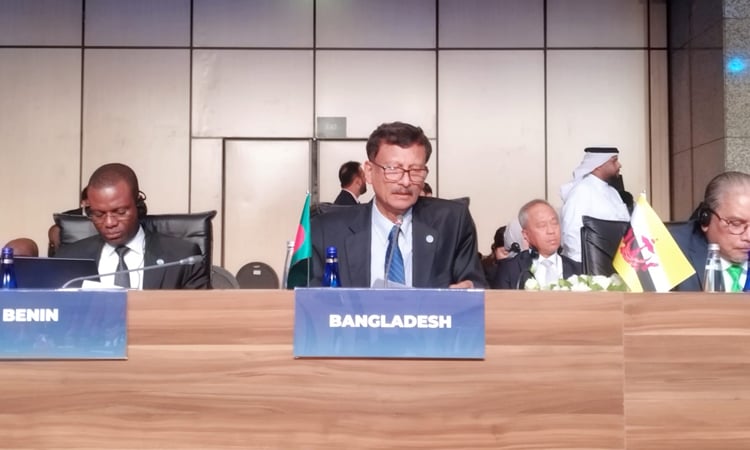News Flash
News Flash

DHAKA, June 21, 2025 (BSS) – Foreign Affairs Adviser Md Touhid Hossain today strongly condemned Israel’s unlawful military aggression against Iran and urged the international community to hold Tel Aviv accountable for its actions that risk regional and global peace.
“Bangladesh calls for an immediate end to such provocations and urges the international community to hold Israel accountable while working collectively to ensure peace through diplomacy and respect for international norms,” he said while delivering his written statement at the 51st session of the OIC Council of Foreign Ministers (CFM) in Istanbul.
He described Israel’s attack on Iran as a “blatant act of aggression” and “a grave violation of international law, the UN Charter, and Iran’s sovereignty,” and warned that “such reckless actions by Israel threaten to destabilize the region and undermine global peace and security.”
Joining the high-level ministerial gathering of the Organisation of Islamic Cooperation (OIC), the foreign adviser also drew attention to the continued Israeli onslaught in Gaza, describing it as genocidal and ongoing for over 600 days.
“Bangladesh strongly condemns the Israeli genocidal intent and onslaught in Gaza. This continues to result in the loss of innocent lives, destruction of civilian infrastructure, and systematic violations of international human rights and humanitarian law,” he said.
Calling for an immediate and lasting ceasefire in Gaza, Touhid reiterated Dhaka’s support for “a credible, irreversible path toward a two-state solution, with East Jerusalem as the capital of an independent and sovereign Palestine based on the 1967 borders.”
He called on the OIC to remain united in demanding justice and accountability through the International Court of Justice (ICJ) and the International Criminal Court (ICC), urging that “our solidarity must translate into strategic and sustained action.”
The foreign adviser also underscored the urgency of a sustainable solution to the Rohingya crisis, warning that continued delay could pose a serious security threat to the region.
“The Rohingya crisis is no longer sustainable. It can be a threat multiplier that can jeopardize regional and global security,” he said, stressing that “the ultimate solution lies in ensuring a safe, voluntary, and dignified repatriation to their homeland, the Rakhine State, Myanmar.”
Touhid urged enhanced diplomatic pressure on Myanmar and greater burden-sharing by OIC member states while acknowledging the legal initiatives at the ICJ and the support from The Gambia.
He invited all OIC members to participate in the upcoming High-Level Conference on Rohingya Muslims, scheduled to be held on September 30, 2025, at the UN Headquarters.
Turning to the broader challenges across the Muslim world, he called for more robust OIC engagement in mediation, peace building, and humanitarian efforts in conflict zones such as Yemen, Sudan, Libya, and Syria.
Welcoming the UN’s recognition of March 15 as the International Day to Combat Islamophobia, Touhid said the OIC must “lead with joint legal, educational, and media strategies to counter hate, foster tolerance, and uphold the dignity of our faith and its followers.”
The adviser stressed the need for OIC to expand its developmental agenda through investments in infrastructure, digital economy, health, food security, and skills development.
He highlighted Bangladesh’s proposal for “a cooperation framework for contract farming and viable business models to enhance food security among the Member States.”
On climate resilience, Touhid proposed an OIC Climate Resilience Initiative and an OIC Innovation Network to mobilize youth and researchers.
He also outlined Bangladesh’s strengthened engagement with the OIC, noting the country’s recent signing of the OIC Anti-Corruption Convention and the Labour Centre Statute, as well as the establishment of a permanent mission to the OIC.
Touhid also briefed the OIC on Bangladesh’s current political transition under the interim government led by Nobel Peace Laureate Professor Muhammad Yunus.
“At this historic juncture, we firmly believe that the solidarity of the OIC Member States is important in ensuring a successful, peaceful, and people-oriented transition in Bangladesh,” he said.
He urged member states to reinforce the OIC’s role as a transformative force and reaffirm “our shared principles of justice, equity, and unity.”